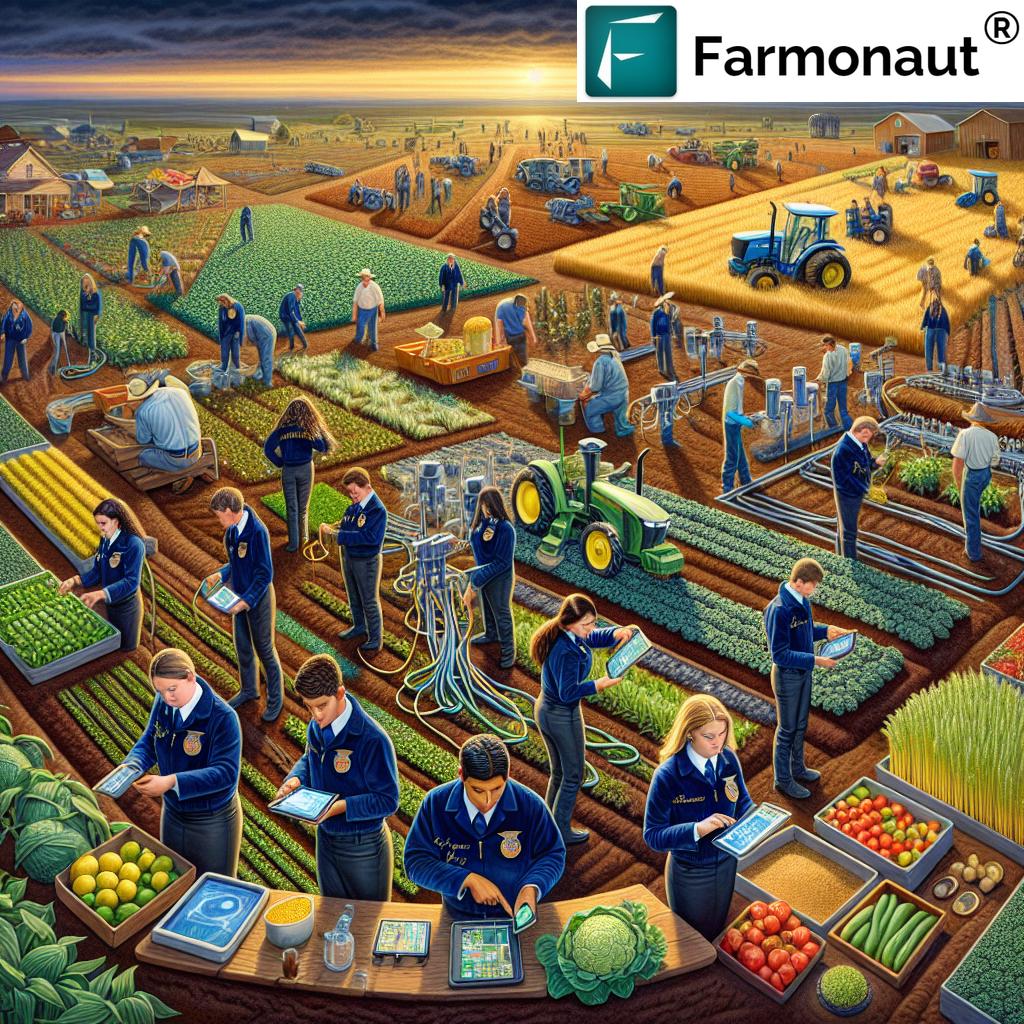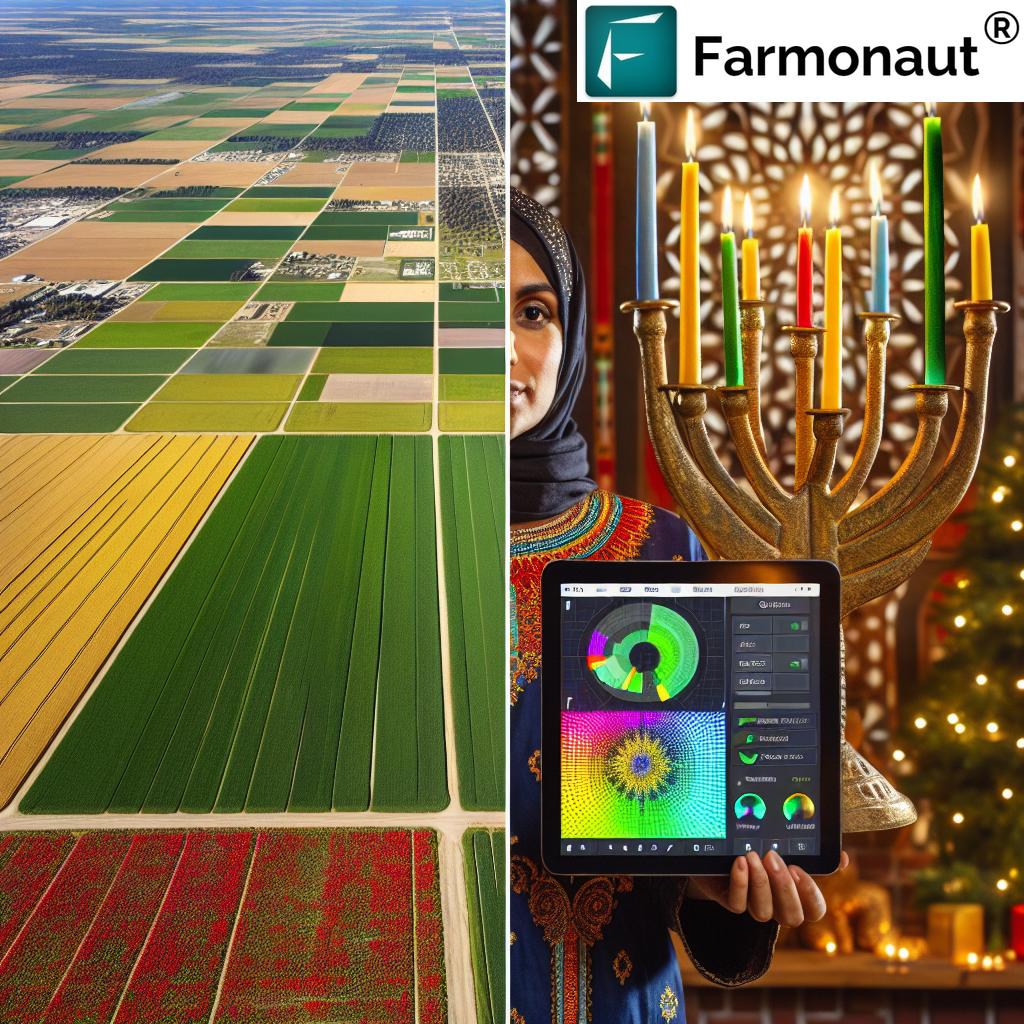Unlocking Agricultural Success: How Farm Peer Advisory Groups Drive Professional Growth in the United States
“Over 90% of farmers in peer advisory groups report improved decision-making skills for their agricultural operations.”
In the ever-evolving landscape of agriculture in the United States, farm peer advisory groups have emerged as a powerful catalyst for professional growth and farm business management. These small, informal gatherings of like-minded farmers are revolutionizing the way we approach agricultural challenges, share knowledge, and drive success in our operations. In this comprehensive guide, we’ll explore how farm peer advisory groups are transforming the agricultural sector, providing invaluable support, and fostering a culture of continuous improvement among farmers across the nation.
The Power of Collaborative Learning in Agriculture
Farm peer advisory groups serve as a vital platform for agricultural professional development, offering a unique blend of practical experience, diverse perspectives, and collective problem-solving. By participating in these groups, farmers gain access to a wealth of knowledge that extends far beyond their individual experiences, enabling them to tackle complex issues and make informed decisions about their farm operations.
- Shared expertise and best practices
- Real-time problem-solving and brainstorming
- Exposure to innovative farming techniques
- Support for implementing new technologies
As we delve deeper into the benefits of farm peer advisory groups, it’s important to recognize the role of technology in enhancing these collaborative efforts. Platforms like Farmonaut, with its advanced satellite-based farm management solutions, complement the peer-driven learning process by providing data-driven insights that can be shared and discussed within these groups.
[Include the first image here with the specified styling]
Key Components of Successful Farm Peer Advisory Groups
To fully leverage the potential of farm peer advisory groups, it’s crucial to understand the elements that contribute to their effectiveness. Let’s explore the essential components that make these groups a valuable resource for agricultural professional development:
- Regular Meetings: Consistency is key in maintaining momentum and fostering trust among group members. Meetings should be held regularly, whether monthly or quarterly, to ensure ongoing engagement and support.
- Diverse Membership: A mix of farmers with varying experience levels, farm sizes, and specialties contributes to a rich pool of knowledge and perspectives.
- Structured Discussions: While meetings may be informal, having a loose structure or agenda helps keep conversations focused and productive.
- Confidentiality: Creating a safe space for open dialogue is crucial. Members should agree to keep sensitive information within the group.
- Goal Setting: Encouraging members to set and share personal and business goals provides direction and accountability.
By incorporating these elements, farm peer advisory groups create an environment conducive to learning, growth, and mutual support. This collaborative approach to farm business management has proven to be an effective strategy for addressing the complex challenges faced by modern farmers.
Benefits of Participating in Farm Peer Advisory Groups
The advantages of joining a farm peer advisory group extend far beyond simple knowledge sharing. Let’s explore the multifaceted benefits that these groups offer to farmers in the United States:
- Enhanced Decision-Making: Exposure to diverse viewpoints and experiences helps farmers make more informed decisions about their operations.
- Improved Problem-Solving Skills: Collaborative brainstorming sessions sharpen critical thinking and problem-solving abilities.
- Access to Collective Wisdom: Tapping into the combined experience of group members provides invaluable insights and practical solutions.
- Emotional Support: Farming can be isolating, and peer groups offer a sense of community and emotional backing during challenging times.
- Accountability: Setting goals within the group creates a sense of responsibility and motivates members to follow through on their plans.
These benefits contribute significantly to the professional growth and success of farmers participating in peer advisory groups. By leveraging the collective knowledge and support of their peers, farmers can navigate the complexities of modern agriculture more effectively.
[Embed the first YouTube video here with the specified styling]
Addressing Key Agricultural Challenges Through Peer Support
Farm peer advisory groups serve as effective sounding boards for addressing a wide range of agricultural business challenges. By bringing together diverse perspectives and experiences, these groups help farmers tackle issues such as:
- Financial Management: Discussing strategies for securing loans, managing cash flow, and optimizing farm finances.
- Resource Allocation: Sharing insights on efficient use of land, water, and other resources to maximize productivity.
- Technology Adoption: Exploring the implementation of new farming technologies and sharing experiences with agritech solutions.
- Succession Planning: Addressing the complex issue of farm succession and family business transitions.
- Market Trends: Analyzing market dynamics and developing strategies to adapt to changing consumer demands.
Through open discussions and collaborative problem-solving, farm peer advisory groups empower members to overcome obstacles and seize opportunities in the ever-changing agricultural landscape.
“Farmers participating in peer groups see an average 15% increase in profitability within the first year of joining.”
The Role of Technology in Enhancing Peer Group Discussions
As we explore the benefits of farm peer advisory groups, it’s important to recognize how technology can amplify their effectiveness. Advanced agricultural solutions, such as those offered by Farmonaut, provide valuable data and insights that can enrich group discussions and decision-making processes.
Farmonaut’s satellite-based crop health monitoring and AI-driven advisory systems offer farmers access to real-time data on their operations. This information can be shared within peer groups, leading to more informed conversations about crop management, resource allocation, and technology implementation.
To learn more about how technology can support your farming operations, consider exploring Farmonaut’s offerings:
[Include App Button Image, Android App Button Image, and iOS App Button Image here with specified styling and links]
By integrating technology-driven insights with peer group discussions, farmers can make more informed decisions and drive continuous improvement in their operations.
[Embed the second YouTube video here with the specified styling]
Implementing Farm Operation Strategies Developed in Peer Groups
One of the most valuable aspects of farm peer advisory groups is the opportunity to develop and refine farm operation strategies collectively. Here’s how farmers can effectively implement the insights gained from these group discussions:
- Action Planning: Create detailed action plans based on group recommendations, setting clear goals and timelines.
- Phased Implementation: Start with small-scale trials of new strategies before full-scale adoption.
- Regular Progress Updates: Share progress and challenges with the group to receive ongoing support and advice.
- Data-Driven Decision Making: Utilize technologies like Farmonaut’s satellite monitoring to track the impact of implemented strategies.
- Continuous Improvement: Use feedback from the group to refine and adjust strategies over time.
By following this approach, farmers can effectively translate the collective wisdom of their peer advisory group into tangible improvements in their farm operations.
[Include the second image here with the specified styling]
Leveraging Peer Groups for Agricultural Succession Planning
Agricultural succession planning is a critical yet often challenging aspect of farm management. Farm peer advisory groups can play a crucial role in navigating this complex process:
- Sharing Experiences: Learn from others who have successfully transitioned their farms to the next generation.
- Legal and Financial Guidance: Discuss strategies for addressing legal and financial aspects of succession planning.
- Family Dynamics: Explore approaches to managing family relationships during the transition process.
- Mentorship Opportunities: Connect younger farmers with experienced members for guidance and support.
- Long-term Vision: Develop strategies for ensuring the farm’s long-term sustainability beyond the current generation.
By addressing succession planning within the supportive environment of a peer advisory group, farmers can navigate this crucial process more effectively, ensuring the continuity and success of their agricultural legacy.
[Embed the third YouTube video here with the specified styling]
Building Trust and Fostering Open Communication in Farm Peer Advisory Groups
The success of farm peer advisory groups hinges on the establishment of trust and open communication among members. Here are key strategies for cultivating a supportive and productive group dynamic:
- Confidentiality Agreements: Implement clear guidelines for maintaining confidentiality within the group.
- Active Listening: Encourage members to practice active listening and show genuine interest in others’ perspectives.
- Non-Judgmental Environment: Foster a culture where members feel safe sharing challenges and seeking advice without fear of judgment.
- Rotating Leadership: Allow different members to lead discussions, promoting equal participation and diverse viewpoints.
- Team-Building Activities: Incorporate occasional social events or team-building exercises to strengthen relationships outside of formal meetings.
By prioritizing trust and open communication, farm peer advisory groups create an environment where members feel comfortable sharing their experiences, challenges, and innovative ideas, leading to more productive and insightful discussions.
Integrating Agritech Solutions into Peer Group Discussions
As technology continues to revolutionize agriculture, incorporating agritech solutions into peer group discussions can provide valuable insights and drive innovation. Here’s how farm peer advisory groups can effectively integrate technology into their conversations:
- Tech Demonstrations: Invite members to showcase and demonstrate new technologies they’ve implemented on their farms.
- Data Analysis Sessions: Use group meetings to collectively analyze data from tools like Farmonaut’s satellite monitoring, discussing trends and implications.
- Collaborative Problem-Solving: Leverage technology to address specific challenges identified by group members, exploring how agritech solutions can provide innovative answers.
- Industry Expert Presentations: Invite agritech specialists to present on emerging technologies and their potential impact on farming practices.
- Cost-Benefit Analyses: Work together to evaluate the return on investment for various agritech solutions, sharing experiences and financial insights.
By embracing technology within peer group discussions, farmers can stay at the forefront of agricultural innovation and make informed decisions about implementing new solutions on their farms.
For those interested in exploring advanced agritech solutions, consider checking out Farmonaut’s API for developers:
[Embed the fourth YouTube video here with the specified styling]
Comparison of Farm Peer Advisory Group Benefits
| Benefit Category | Description | Estimated Impact |
|---|---|---|
| Knowledge Sharing | Exchange of practical farming experiences and best practices | High |
| Problem Solving | Collaborative approach to addressing farm-specific challenges | High |
| Technology Adoption | Guidance on implementing new agricultural technologies | Medium to High |
| Business Strategy | Development of effective farm management and growth strategies | High |
| Succession Planning | Support in navigating farm transition and generational transfer | Medium to High |
Creating and Maintaining a Successful Farm Peer Advisory Group
For farmers interested in starting their own peer advisory group or improving an existing one, consider the following steps:
- Identify Potential Members: Seek out farmers with diverse backgrounds and experiences who share a commitment to growth and collaboration.
- Establish Clear Objectives: Define the group’s purpose and goals to ensure alignment among members.
- Set Meeting Frequency and Format: Determine a regular meeting schedule and structure that works for all members.
- Develop Ground Rules: Collectively establish guidelines for confidentiality, participation, and respectful communication.
- Rotate Facilitation Duties: Encourage shared leadership by rotating the responsibility of facilitating meetings.
- Incorporate Technology: Utilize digital tools for scheduling, information sharing, and virtual meetings when necessary.
- Evaluate and Adapt: Regularly assess the group’s effectiveness and be willing to make changes to improve its value to members.
By following these steps, farmers can create and maintain vibrant peer advisory groups that drive professional growth and farm business success.
Conclusion: Embracing the Power of Peer Support in Agriculture
Farm peer advisory groups represent a powerful tool for driving professional growth and success in the agricultural sector. By fostering collaboration, knowledge sharing, and mutual support, these groups empower farmers to navigate the complex challenges of modern agriculture more effectively.
As we’ve explored throughout this guide, the benefits of participating in farm peer advisory groups are multifaceted, ranging from improved decision-making and problem-solving skills to enhanced technology adoption and succession planning. By leveraging the collective wisdom of their peers and integrating advanced agritech solutions like those offered by Farmonaut, farmers can unlock new levels of productivity and innovation in their operations.
We encourage all farmers in the United States to consider joining or creating a peer advisory group. The power of collaborative learning and shared experiences can truly transform your approach to farm management and drive long-term success in your agricultural endeavors.
Frequently Asked Questions (FAQ)
- Q: How often should farm peer advisory groups meet?
A: Most successful groups meet monthly or quarterly, but the frequency can be adjusted based on members’ preferences and schedules. - Q: What is the ideal size for a farm peer advisory group?
A: Groups typically work best with 8-12 members, allowing for diverse perspectives while maintaining intimate discussions. - Q: How can technology enhance farm peer advisory group discussions?
A: Tools like Farmonaut’s satellite monitoring can provide data-driven insights to inform group discussions and decision-making processes. - Q: Are farm peer advisory groups only for large-scale farmers?
A: No, these groups can benefit farmers of all scales, from small growers to large operators. Diversity in farm sizes often leads to more varied and valuable insights. - Q: How can I find a farm peer advisory group in my area?
A: Check with local agricultural extension offices, farming associations, or online farming communities for existing groups or interested farmers.













